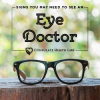Experiencing vision trouble is a natural part of aging. This doesn’t mean, though, that declining vision has to become part of your life. Because issues with your eyes can indicate other health conditions, it’s important to work with an optometrist or ophthalmologist. Not sure what symptoms prompt a visit? Read on.

If it’s been a while
Just like visits to their general practitioner or dentist, some people forget to make appointments with the eye doctor. Others are scared and avoid these important health checkups. According to AgingCare.com, anyone over age 65 should have an annual or bi-annual checkup. This applies to individuals who are experiencing vision issues and those who are not. Seniors with conditions such as macular degeneration or glaucoma, or those who have diabetes may need to see an optometrist or ophthalmologist more frequently.
If your vision worsens suddenly
Typical age-related eye issues occur slowly over time. For example, you may need a stronger pair of glasses or even bifocals, which you did not require 10 years ago. If, however, you suddenly find that you can’t see, everything is blurry or there are spots in your vision, you should see an eye doctor right away. Call your physician and ask for an emergency appointment. He or she will schedule to see you as soon as possible to make sure whatever is causing these symptoms does not worsen or cause permanent damage.
If you need different vision correction
Today, many people wear contacts. These miniscule lenses have replaced glasses for the individuals who are willing and able to put them onto their eyes. Older individuals may not opt for contacts because arthritis makes it painful to try and manipulate the tiny devices. Even gripping a contact to remove it and place it in solution can cause aches. A better option in these cases is to wear eyeglasses. Seniors may also consider having lasik eye surgery to correct vision troubles like near or far-sightedness and astigmatism. The American Academy of Ophthalmology noted there is no age cap on this procedure so long as the person’s eyes are healthy and he or she has clear lenses.
The American Optometric Association noted a few other vision treatment options, like spectacle-mounted magnifiers or telescopes which help seniors see close up and far away. Some older individuals prefer to use hand-held or stand magnifiers for short -term viewing, like if they’re working on a puzzle and need a closer look at an individual piece. There are also video magnification tools that help seniors when watching TV or working on the computer.
Questions to ask the eye doctor
First, you should know whether to see an ophthalmologist or an optometrist. An ophthalmologist is licensed to perform surgery and practice medicine. These professionals have gone through medical school to treat and diagnose eye diseases. Optometrists are not doctors, but have gone through extensive training. They typically spend their time doing eye exams, prescribing medications for some eye diseases and addressing corrective needs.
When you do make an appointment with an eye doctor, it’s helpful to bring along a list of questions to get the most out of your session. Here are a few to consider:
- Will my medication affect my vision? You can bring a list of prescriptions along to the checkup so your eye doctor can make note if any could affect your sight.
- How should I clean my glasses? Many people have trouble keeping their eyeglasses clean. Dust, hair and grease can all make seeing difficult. The eye doctor can clean your glasses and offer tips and tools, like a special cloth and solution, to keep your lenses clean and your vision in top shape.
Don’t forget to write these questions down so you’re ready to ask away when the time comes.
If you found an error, highlight it and press Shift + Enter or click here to inform us.



